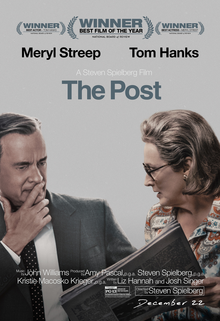Directed by Steven Spielberg
Written by Liz Hannah and Josh Singer
Cast: Meryl Streep, Tom Hanks, Sarah Paulson, Bob Odenkirk, Tracy Letts, Bradley Whitford, Bruce Greenwood, Matthew Rhys, Alison Brie, Carrie Coon, Jesse Plemons, David Cross, Zach Woods, Pat Healy, John Rue, Rick Holmes, Philip Casnoff, Jessie Mueller, Stark Sands, Michael Cyril Creighton, Will Denton, Deirdre Lovejoy, Jennifer Dundas, Austyn Johnson, Brent Langdon, Michael Stuhlbarg, Deborah Green, Gary Wilmes, Christopher Innvar, Justin Swain, Kenneth Tigar, David Aaron Baker, Gannon McHale, Dan Bucatinsky, David Costabile, Johanna Day, Annika Boras, Carolyn McCormick, Peter Van Wagner, Angus Hepburn, James Riordan, Kelly AuCoin, Cotter Smith, Ben Livingston, JaQwan J. Kelly, Shaun O’Hagan, Celeste Arias, Sonny Valicenti, Aaron Roman Weiner, Tom Bair, Mark Jacoby, Curzon Dobell, Neal Huff
Soundtrack: John Williams
Before Watergate.
Before Woodward and Bernstein.
There were The Pentagon Papers.
And thus began the rise of The Washington Post to national prominence, and the downfall of the presidency of one Richard Milhous Nixon.
I said this before when I reviewed Bridge of Spies, and I think it bears repeating. It’s become somewhat popular to hate on Steven Spielberg, and I get it (I mean, I’m about as excited to see Ready Player One as I am to get food poisoning, or cancer), but the fact remains, he’s still Steven Spielberg.
I’m not going to tell you that The Post is “Classic Spielberg”, reminiscent of his heyday in the Seventies and Eighties, but it does at least hearken back to his run in the early Aughts, which isn’t so bad (Catch Me If You Can, anyone?).
On its face, The Post isn’t anything particularly special. It’s nothing that hasn’t been done before, and none of the performances, even from the Oscar winners in the room, are really anything to write home about (though it is fun to see Bob and David in a Spielberg movie together). Yet, somehow, I’m left feeling satisfied, which leads me to conclude that film is greater than the sum of its parts, and I believe that is largely due to that wily old veteran director, Steven Spielberg (and his near-constant collaborator, John Williams; who’s getting up there, kids, so maybe savor this one while we still have them to savor).
For all of his softening and head-scratching decisions over the past fifteen years, the man still knows how to bring a script to life and make it pop, and he still knows where to throw in his signature touches (like those little one-ers you don’t really notice, but your brain does). Was he the absolute best choice to handle this particular material? Maybe not, but they certainly could have done a lot worse.
Speaking of the material, kudos to first-time screenwriter Liz Hannah, who was the initial rolling snowball of this avalanche, and executive producer and writer Josh Singer (who, unsurprisingly, held the same positions on Spotlight), for putting together yet another intricate and no doubt incredibly well-researched period journalism piece (to have a script with roughly fifty real-life people portrayed by credited actors in a two-hour movie just goes to show how deep the dive was). Much like Spotlight (and in contrast to All the President’s Men), The Post works whether you lived though the events or not.
However, I wouldn’t say The Post is all-in-all on the same level as Spotlight, which is to say I don’t think it’s Best Picture material, and the subtext of the film given the current climate is fairly obvious, but still, perhaps for reasons I can’t fully articulate, I have zero issue recommending it.
It’ll make you real depressed about the Vietnam War (but then what doesn’t?), but if you’re a fan of Spielberg, journalism, and/or the First Amendment, The Post‘ll be right up your alley.
Rating: ★★★★☆








